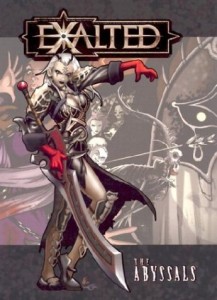 At first glance this might either puzzle you, or it might ring gongs of accord, and yet still puzzle you. By ‘game fiction’ I mean the sort of fiction either produced by game companies (though in particular pencil and paper roleplaying game companies), and in particular, in particular, the fiction that would actually be somewhere in the rules book itself.
At first glance this might either puzzle you, or it might ring gongs of accord, and yet still puzzle you. By ‘game fiction’ I mean the sort of fiction either produced by game companies (though in particular pencil and paper roleplaying game companies), and in particular, in particular, the fiction that would actually be somewhere in the rules book itself.
Now, some game-associated fiction is passable, if not literary. Dragonlance is a good example of fiction that was more or less successful in its own right, and companies like Privateer Press have actually done a rather good job lately of hiring real, published authors to write their in-world fiction lines.
The really bad stuff though tends to appear in game books. These will sometimes be short stories intended to illustrate the setting, or maybe illustrate the gameplay. Sometimes it’s a serial story (spread through the book). Sometimes it’s just a set of small vignettes – this last being typically the least offensive. Sometimes the fiction is actually painful to read. The first line of the introductory fiction for White Wolf’s Abyssals book famously starts (including a typo):
It was a guiltless mad purr that mad [read: made] his skin crawl and his cock rise.
The rest of the fiction descends into badly written softcore. This raises the first of the reasons I think game fiction goes awry. Roleplayers are often desperate for their work to be taken seriously and to be seen as ‘adult’ in a mature and grown up sense. But the truth is, not everyone playing or writing games is very mature, and persons who are a bit less than mature often mistake ‘knowingness’ for ‘maturity’. That is, sex (especially) and violence (a bit) and pessimistic, worldweary, cynicism (often, but not always) are seen as markers of adulthood, and a wandering mess of these ‘knowing’ themes results. Understanding that ‘mature’ themes might have more to do with themes of parenthood, responsibility, old age, hopes subsumed by workaday life and newfound wishes for the next generation (or similar) often doesn’t seem to register.
This alone doesn’t explain why the fiction itself is frequently so terrible. Even ‘knowing’ softcore-ish stuff can be written well. I think there’s something else quite distinct going on here. The experience of gaming isn’t the same as the experience of reading a narrative. For one thing, most gamers don’t especially want their characters to suffer (or at least, not a lot) whereas suffering – be it emotional or physical or spiritual or existential or something) – is sort of required for a reader to get a sense of sympathy for characters in fiction. Even where gamers claim to like ‘narrativist’ games, the narrative doesn’t often seem to match up with what I would consider a story in the usual sense. Often narrativist games are more like an exercise in social interaction with a bit of melodrama thrown in. Building fiction out of social interaction is possible, but unless you are P.G. Wodehouse or Oscar Wilde, you may not find it the easiest of rows to hoe.
This leads to a sort of askance taste, where the gamer is trying to capture the grand ‘story’ of some game or another, or even just the spirit of such stories, and ends up generating something that requires too much personal and social experience of those involved with a game to be appreciated by those not involved. This is close to the old problem of producing something personal enough to be original and general enough to be accessible. Here though, I guess perhaps a sort of ‘in-group personal’ taste takes over, and without context the whole mess just seems indulgent and overwritten.
Finally, the sorts of worlds games take place in are not always good for fiction and vice versa. Middle Earth is a wonderful place to set a story, but it has too few moving pieces to be a good game world. The solution game companies arrive at is to invent new things and bolt them onto Middle Earth – a sort of Middle Earth expanded universe, if you will. Going in the other direction is tricky, because now you probably need to tighten the focus right down onto a small area or a small cast and ignore all the other movers and shakers of the world. This can be done, but it perhaps isn’t always understood or done well, and so the weird kitchen sink setting (often needed for a game world to be playable) can be dragged shrieking into a story, and this acts to just further bog down a story that is already impenetrable because of the reader missing the necessary in-group/social/personal context.
That’s a bit of my take on it anyway. I think it’s an interesting phenomenon because just by a law of averages you’d expect some game fiction to be really pretty good (which is very seldom the case) and a small bit of game fiction should be both widely accessible and timeless in its execution (which has happened basically never as far as I know).

